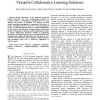32 search results - page 2 / 7 » Managing tacit and explicit knowledge in organisational team... |
HICSS
2005
IEEE
13 years 10 months ago
2005
IEEE
The most popular unit of work in organizations is a project. Managing knowledge in and about projects is salient for successful project management. Explicit knowledge is easier to...
ACHI
2008
IEEE
13 years 11 months ago
2008
IEEE
—In the framework of the European Integrated Project PALETTE, the École Polytechnique Fédérale de Lausanne (EPFL) is developing the eLogbook Web 2.0 social software. The purpo...
ICSE
2005
IEEE-ACM
14 years 5 months ago
2005
IEEE-ACM
Design for change is a well-known adagium in software engineering. We separate concerns, employ well-designed interfaces, and the like to ease evolution of the systems we build. W...
HICSS
2006
IEEE
13 years 11 months ago
2006
IEEE
Knowledge management (KM) has been an increasing focus for both researchers and practitioners for more than a decade. The discussions generally have viewed the goal of KM as the a...
BIS
2009
13 years 2 months ago
2009
Abstract. Knowledge based systems improve information interoperability, integration, and knowledge management. Consequently, there is envisioned a set of the associated business be...

